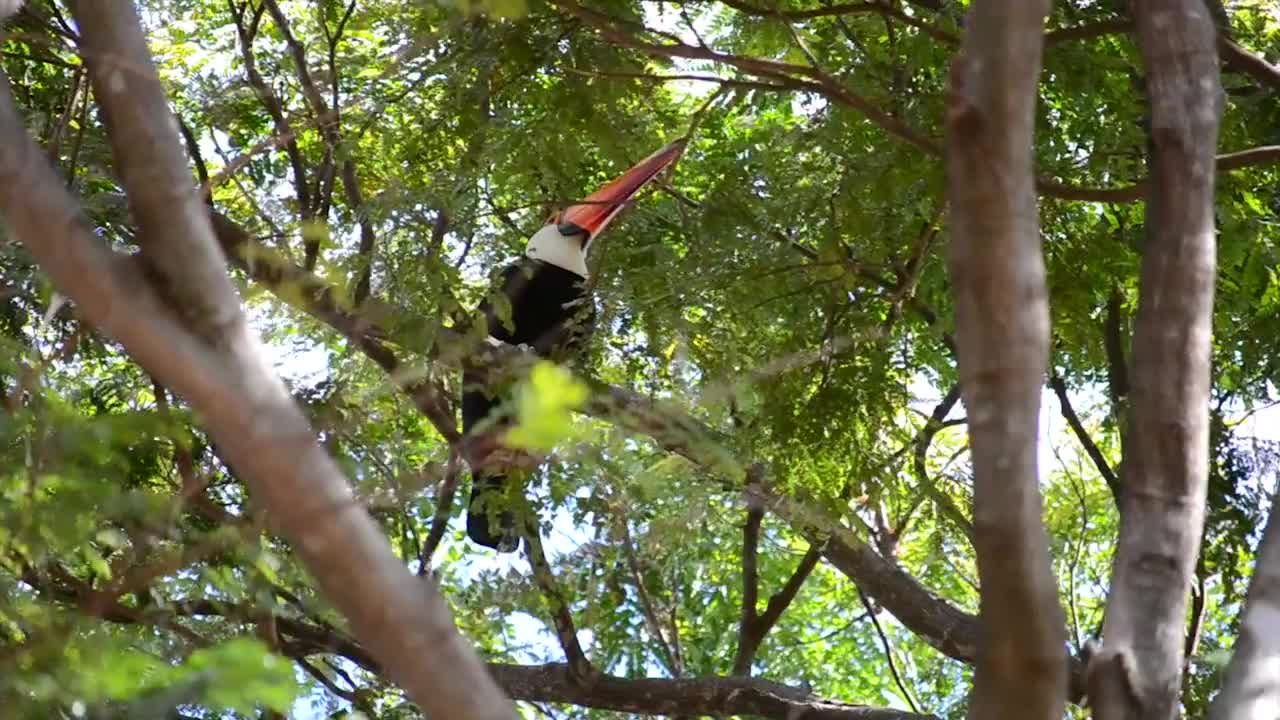Premium Only Content

Brazilian Tucano Bird Spotted On Tree Branch
In feeding, the toucan obtains food with the saw-edged bill and must toss back its head before swallowing. Although toucans are often considered to be primarily fruit eaters, most species consume a wide variety of food, including insects, snakes, frogs, and occasionally even small mammals. Toucans are also predators on the contents of songbird nests, consuming both eggs and nestlings. In foraging, toucans form large associations of two or more species that search for fruiting trees.
Measuring 63.5 cm (25 in.) in length, the toco toucan is the largest of all toucans. Its black body and white throat are overshadowed by its most recognizable trait: a large colorful beak.
The bright orange beak is about 19 cm (8 in.) long – one third of the bird’s total length. But despite its substantial size, the beak weighs less than you may think. Composed of the protein keratin, the structure of beak incorporates many air pockets allowing for a very low mass.
Furthermore, recent research has concluded that toucans regulate body temperature by adjusting the flow of blood to their beak. More blood flow means more heat is released. When toucans sleep, they tuck their beak under their feathers to keep them warm.
Toco toucans also use their beaks to pluck and peel fruit, their main source of food. In addition, the beak houses a flat tongue of the same length, which helps the toucan catch insects, frogs, and reptiles. Toco toucans also occasionally eat the eggs of other birds.
Although they spend a lot of time in trees, they are not very good at flying. Toucans mainly travel among trees by hopping. When they do take flight, they flap their wings vigorously and glide, traveling only short distances.
Toucans nest in the hollows of trees. They often move into cavities created and abandoned by woodpeckers.
Several toucans live together in a single hollow. It is in these hollows that they lay their eggs, generally two to four a year. Both parents incubate the eggs for 16-20 days. Once the chicks hatch, both parents continue to care for the young. Baby toucans are not born with an excessively large beak; the beak grows as the birds develop.
Native to South America, toco toucans inhabit a range of habitats including tropical forests, savannas, and shrubland.
-
 3:40:59
3:40:59
FreshandFit
5 hours agoAfter Hours w/ Girls
67.1K24 -
 2:06:07
2:06:07
TimcastIRL
6 hours agoDemocrats LOSE IT Over SECOND Liberal Judge ARRESTED By Trump Admin | Timcast IRL
183K155 -
 1:26:16
1:26:16
Man in America
21 hours agoEXPOSED: Trump's COVERT War Against the European Banking Cartel w/ Tom Luongo
49K17 -
 1:45:48
1:45:48
Glenn Greenwald
10 hours agoGlenn Reacts to News of the Week; Plus: Audience Q&A | SYSTEM UPDATE #443
95.5K71 -
 11:05:38
11:05:38
Dr Disrespect
14 hours ago🔴LIVE - DR DISRESPECT - PUBG - 5 CHICKEN DINNERS CHALLENGE
195K19 -
 3:23:12
3:23:12
I_Came_With_Fire_Podcast
14 hours agoSHALL NOT BE INFRINGED| THE TYRANNY OF UNELECTED BUREAUCRATS | XI BOWS
29K4 -
 4:19:36
4:19:36
SynthTrax & DJ Cheezus Livestreams
15 hours agoFriday Night Synthwave 80s 90s Electronica and more DJ MIX Livestream THE GREAT EDO WARS OF 2067 Edition
55.9K4 -
 4:45:15
4:45:15
RalliedLIVE
6 hours ago $1.24 earnedWarzone Domination w/ Ral
40.8K -
 1:10:17
1:10:17
Sarah Westall
8 hours agoWorld Leaders Increasingly Display Panic Behavior as Economic Change Accelerates w/ Andy Schectman
64.8K12 -
 59:54
59:54
Motherland Casino
5 hours ago $0.95 earnedScar x Ayanna
23K5